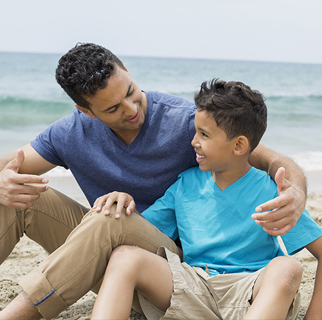Guidelines for Raising Smoke-Free Kids

Parents can take practical steps to keep their children smoke-free. At first, young people start smoking to look cool. They don't understand that tobacco is addictive. E-cigarettes often contain nicotine and are also considered a tobacco product. But a person who starts smoking when young is likely to continue the habit into adulthood. And quitting smoking later in life is a hard task.
What you can do
Here are specific steps you can take to keep your children from smoking:
-
If you smoke, quit. Children look to their parents as an example. Children of smokers are more likely to smoke than children of nonsmokers.
-
Start talking about smoking when your kids are young. Talk about the dangers of smoking when your children are ages 5 or 6. If you wait until they're 11 or 12, when they're likely to be tempted to try cigarettes, their health attitudes are already pretty well set.
-
Talk with your kids about advertising. Explain to your children how tobacco advertising through TV, movies, and social media manipulates people. It tries to make them believe that smoking is cool, socially acceptable, and will improve their image.
-
Remind them of the cost of smoking. Point out to your children that teens who spend money on smoking could have bought makeup, new clothes, video games, or other things that matter to them.
-
Pay attention to your children's friends. The chances they'll smoke are greater if they have close friends who smoke. If your children's friends smoke, don't wait until your children start smoking to say something. Bring up the subject first and help them deal with peer pressure.
-
Get to know the parents of your children's friends. Are they smokers? Do they allow smoking? Are they concerned with raising nonsmoking children? Work with other parents to keep informed about your kids’ activities. And get kids involved in activities that are not linked to smoking. These include organized sports, hiking, biking, or other athletic activities.
-
Know what you're talking about. Become well-informed about the dangers of smoking. When talking with your children about smoking, it's important to have the facts. There's no need to exaggerate or to say smoking is worse than it is. The truth is bad enough.
-
Arm your children with feelings of self-confidence and self-worth. What does self-confidence have to do with not smoking? Everything. Children who feel belittled at home, or who are overly controlled, will seek to escape one way or another. They will often take up smoking to rebel against authority figures.
-
Talk with teens about what matters to them. Tell teens about the negative effects of smoking that may matter most at their age. These include bad breath, yellow teeth, and reduced athletic abilities. Teens often don't respond to warnings about the long-term health consequences.
-
Tell teens about the harmful effects of e-cigarettes. These include serious lung diseases and harmful effects to their developing brains. Other names for e-cigarettes include e-cigs, e-hookahs, mods, vape pens, and tank systems.
Online Medical Reviewer:
L Renee Watson MSN RN
Online Medical Reviewer:
Liora C Adler MD
Online Medical Reviewer:
Tennille Dozier RN BSN RDMS
Date Last Reviewed:
9/1/2023
© 2000-2025 The StayWell Company, LLC. All rights reserved. This information is not intended as a substitute for professional medical care. Always follow your healthcare professional's instructions.